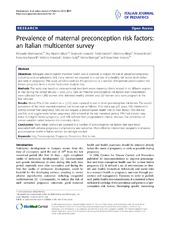| dc.contributor.author | Mastroiacovo, Pierpaolo | en_US |
| dc.contributor.author | Nilsen, Roy Miodini | en_US |
| dc.contributor.author | Leoncini, Emanuele | en_US |
| dc.contributor.author | Gastaldi, Paolo | en_US |
| dc.contributor.author | Allegri, Valentina | en_US |
| dc.contributor.author | Boiani, Arianna | en_US |
| dc.contributor.author | Faravelli, Francesca | en_US |
| dc.contributor.author | Ferrazzoli, Federica | en_US |
| dc.contributor.author | Guala, Andrea | en_US |
| dc.contributor.author | Madrigali, Valeria | en_US |
| dc.contributor.author | Scarano, Gioacchino | en_US |
| dc.date.accessioned | 2015-01-07T13:09:27Z | |
| dc.date.available | 2015-01-07T13:09:27Z | |
| dc.date.issued | 2014-11-23 | eng |
| dc.identifier.issn | 1824-7288 | |
| dc.identifier.uri | https://hdl.handle.net/1956/9088 | |
| dc.description.abstract | Objectives: Adequate preconception maternal health care is essential to reduce the risk of unwanted pregnancy outcomes and complications. Still, many women are exposed to a number of unhealthy risk factors both before and early in pregnancy. This study aimed to estimate the prevalence of a number of important preconception risk factors using data from a recent multicenter study in Italy. Methods: The study was based on cross-sectional data from seven maternity clinics located in six different regions in Italy during the period January – June, 2012. Data on maternal preconception risk factors and characteristics were collected from 1,892 women who delivered healthy children and 320 women who were pregnant in the first trimester. Results: About 97% of the women (n = 2,212) were exposed to one or more preconception risk factors. The overall prevalence of the most essential maternal risk factors was as follows: 41% had a age ≥35 years, 36% mistimed or did not intend their pregnancy, 58% did not request a preconception health visit to their doctor, 76% did not use folic acid supplements before pregnancy, 26% smoked at the last menstrual period, 19% had a body mass index ≥25 kg/m2 before pregnancy, and 10% suffered from pregestational chronic diseases. The prevalence of certain variables varied between the maternity clinics. Conclusions: Many Italian women are exposed to a number of preconception risk factors that have been associated with adverse pregnancy complications and outcomes. More effective intervention programs to improve preconception health in Italian women are strongly needed. | en_US |
| dc.language.iso | eng | eng |
| dc.publisher | BioMed Central | eng |
| dc.rights | Attribution CC BY | eng |
| dc.rights.uri | http://creativecommons.org/licenses/by/4.0 | eng |
| dc.subject | Italy | eng |
| dc.subject | Preconception | eng |
| dc.subject | Pregnancy | eng |
| dc.subject | Prevalence | eng |
| dc.subject | Risk factors | eng |
| dc.title | Prevalence of maternal preconception risk factors: an Italian multicenter survey | en_US |
| dc.type | Peer reviewed | |
| dc.type | Journal article | |
| dc.date.updated | 2014-12-11T21:01:02Z | |
| dc.description.version | publishedVersion | en_US |
| dc.rights.holder | Copyright 2014 Mastroiacovo et al.; licensee BioMed Central Ltd | |
| dc.rights.holder | Pierpaolo Mastroiacovo et al.; licensee BioMed Central Ltd. | |
| dc.source.articlenumber | 91 | |
| dc.identifier.doi | https://doi.org/10.1186/s13052-014-0091-5 | |
| dc.source.journal | Italian Journal of Pediatrics | |
| dc.source.40 | 40 | |

